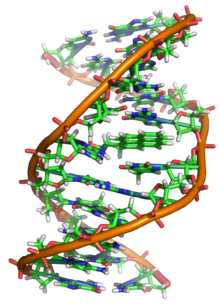
In molecular genetics, a DNA adduct is a segment of DNA bound to a cancer-causing chemical. This process could lead to the development of cancerous cells, or carcinogenesis. DNA adducts in scientific experiments are used as biomarkers of exposure. They are especially useful in quantifying an organism's exposure to a carcinogen.[1] The presence of such an adduct indicates prior exposure to a potential carcinogen, but it does not necessarily indicate the presence of cancer in the subject animal.
DNA adducts are researched in laboratory settings. A typical experimental design for studying DNA adducts is to induce them with known carcinogens. A scientific journal will often incorporate the name of the carcinogen with their experimental design. For example, the term "DMBA-DNA adduct" in a scientific journal refers to a piece of DNA that has DMBA (7,12-dimethylbenz(a)anthracene) attached to it. [2]
- ^ Poirier MC (June 1997). "DNA adducts as exposure biomarkers and indicators of cancer risk". Environmental Health Perspectives. 105 (Suppl 4): 907–912. doi:10.1289/ehp.97105s4907. PMC 1470061. PMID 9255579.
- ^ Maltzman TH, Christou M, Gould MN, Jefcoate CR (November 1991). "Effects of monoterpenoids on in vivo DMBA-DNA adduct formation and on phase I hepatic metabolizing enzymes". Carcinogenesis. 12 (11): 2081–2087. doi:10.1093/carcin/12.11.2081. PMID 1934293.